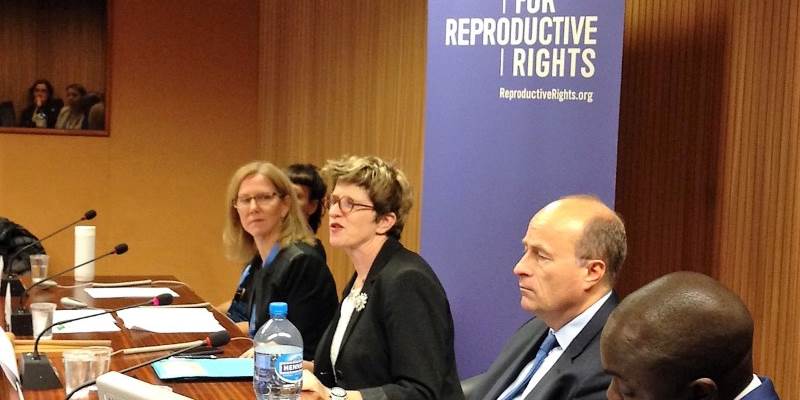Check against delivery
Thank you for inviting me to address this important topic. Thanks in particular to the Center for Reproductive Rights for organizing this event, and to the Deputy High Commissioner, and the other members in this panel, for your tireless efforts in this area. To promote sexual and reproductive health and rights of girls, women – as well as for men and boys – is a priority for the Norwegian government.
In our view, sexual and reproductive health and rights are fundamental rights. They are also integral parts of our work to promote women’s rights and gender equality more generally; as well as to promote economic growth and sustainable development.
For Norway, sexual and reproductive health and rights include a commitment to promote international acceptance of sexual rights, including access to safe and legal abortion, for all women and girls.
In recent years, we have seen a backlash against women’s rights in general, and sexual and reproductive health and rights in particular. We are greatly concerned about these developments.
Here in Geneva and elsewhere, we see efforts to weaken the normative standards we agreed on at the important conferences in Cairo and Beijing in the mid-1990s.
During the past year, we have also witnessed a dramatic and deeply concerning drop in the level of financial support to organizations working to promote and fulfill the sexual and reproductive health and rights of girls, women, men and boys.
For organizations like UNFPA, but also for many civil society organizations, these cuts have severe programmatic consequences and limit their capacity to deliver essential services to women and girls worldwide. And, as we all know, the true cost by a decrease in funding to these organizations will at the end of the day be carried by women and girls, many of whom find themselves in a desperate situation of humanitarian need.
These funding cuts can also have serious negative political consequences: There is a risk that these cuts will reinforce those actors that are opposing sexual and reproductive rights.
It is therefore important that those who defend and promote these rights mobilize to counter these trends, and that we increase our efforts. We cannot allow our work to backslide. We cannot allow a reversal of our achievements.
Norway supports the She Decides movement both politically and financially. In addition to our strong support for UNFPA, we support and channel our work through global platforms that mobilize a broad range of actors, such as Every Woman, Every Child, The Partnership for Maternal, Newborn and Child Health (PMNCH), Women Deliver, as well as a several international NGOs.
Overall, Norway’s annual level of support to SRHR is around 140 million USD. At the Family Planning Summit in London on 11 July this year, Norway announced an increase of 85 million USD in its funding to SRHR, from 2017 – 2020. This funding increase includes:
- A boost in our core contribution to UNFPA by 25%.
- 19 million USD annually to UNFPA Supplies from 2018 - 2020.
- An increase in funding to international NGOs that work to protect, promote and provide sexual and reproductive health and rights, including access to safe and legal abortions.
In addition, we announced that we would work together with UNFPA to promote comprehensive sexuality education and that we plan to host a high-level conference on this topic.
However, while funding is important to contain the normative backlash in this area, it is not enough. So let me take you through some of the actions Norway will take to protect sexual and reproductive health and reproductive rights and promote sexual rights in the months and years to come:
First, Norway will continue to work closely with other likeminded countries. However, to succeed, we also need to increase our collaboration with countries on all continents that have good national policies, and encourage them to raise their voices on the global scene.
Second, the UN has an important role to play at the national, regional and global level. Norway will continue to engage actively in intergovernmental fora such as the Commission on the Status of Women (CSW), and the Commission on Population and Development (CPD), as well as in Executive Board Meetings of multilateral organizations.
In addition, we will continue to emphasize and support the mandate of various UN Agencies, and make certain that they advocate, provide policy advice and technical support related to sexual and reproductive health, and reproductive rights.
Third, Norway will continue to promote sexual and reproductive health and reproductive rights here at the Human Rights Council and within human rights mechanisms such as the Universal Periodic Review (UPD). In fact, we are the country that has raised access to safe and legal abortions related to regional commitments, most frequently during the UPR’s country reviews, and will continue to do so. Only by speaking out and by highlighting the well-documented case for SRHR, can we hope for positive change in this area.
Finally, we will continue to work with civil society and human rights defenders to find ways to support their important work and reinforce their messages, including at the country level. At the end of the day, it is at the country level that sustainable social change happens. Civil society plays a crucial role, in advocacy, service provision, monitoring, and in keeping governments accountable.
In conclusion, let me underline that Norway seeks to be a clear, trusted and constructive partner. We therefore also engage, and will continue to engage, in dialogues with countries that do not share our views in this area.
Thank you.
